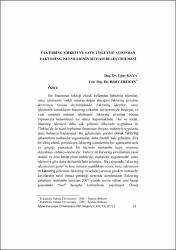Faktoring şirketi ve satıcı işletme açısından faktoring işlemlerinin muhasebeleştirilmesi
Citation
Kaya, U , , , Gerekan, B . (2011). FAKTORİNG ŞİRKETİ VE SATICI İŞLETME AÇISINDAN FAKTORİNG İŞLEMLERİNİN MUHASEBELEŞTİRİLMESİ . Afyon Kocatepe Üniversitesi İktisadi ve İdari Bilimler Fakültesi Dergisi , 13 (2) , 71-101Abstract
Bir finansman tekniği olarak kullanılan faktoring işlemleri, satıcı işletmenin vadeli satıştan doğan alacağını faktoring şirketine devretmesi esasına dayanmaktadır. Faktoring işlemleri, satıcı işletmenin alacaklarını faktoring şirketine devretmesiyle başlayan ve vade sonunda müşteri işletmenin faktoring şirketine ödeme yapmasıyla tamamlanan bir süreci kapsamaktadır. Her ne kadar, faktoring işlemleri daha çok gelişmiş ülkelerde uygulansa da Türkiye’de de ticari toplumun finansman ihtiyacı nedeniyle uygulama alanı bulmaya başlamıştır. Bu gelişmelere paralel olarak faktoring şirketlerinin muhasebe uygulamaları daha önemli hale gelmiştir. Zira bir süreç olarak gerçekleşen faktoring işlemlerinin her aşamasının açık ve gerçeği yansıtacak bir biçimde muhasebe kayıt ortamına aktarılması oldukça önemlidir. Türkiye’de faktoring şirketlerinin yasal statüsü ve özel hesap planı nedeniyle, muhasebe uygulamaları satıcı işletmeye göre daha da önemli hale gelmiştir. Bu çalışmada; faktoring işlemlerinin genel ve kısa sunumu yapıldıktan sonra, satıcı işletmenin ve faktoring şirketinin faktoring sürecinde yapması gereken muhasebe kayıtlarının nasıl olması gerektiği üzerinde durulmuştur. Faktoring şirketinin muhasebe kayıtları 2007 yılında revize edilen yeni hesap planındaki “özel” hesaplar kullanılarak yapılmıştır. Örnek uygulamalar iki popüler faktoring türü (kabili rücu ve gayri kabili rücu) esas alınarak hazırlanmıştır. Factoring transactions used as a financing technique are based on a seller enterprise’s transferring its receivables arising from sales on credit to the factoring company. Factoring transactions cover a process which starts when the seller enterprise transfers its receivables to a factoring company and ends when the client enterprise pays the factoring company on the maturity date. Although factoring is a modern technique of financing that is done especially in the developed countries, in Turkey it tends to become a customary practice due to the needs of financing of the commercial societies. Parallel to these developments, accounting approaches regarding the factoring business also became important. Because bookkeeping of every stage of factoring transactions, occurring as a process, in the accounting record in a clear and truthful manner is highly important. Especially for factoring companies, because of their legal status in Turkey, special chart of accounts, accounting treatments are more important than seller enterprise. This paper has as its goal a short presentation of the factoring operation and of the implications that these operations have upon the accounting of the factor but also of the adherent. But main focus is on how accounting records are required to be kept regarding factoring companies using special accounts in the new chart of accounts which was revised in 2007. Examples were prepared based on two popular type of factoring (first one is factoring with recourse and the other one is factoring without recourse).
Source
İktisadi ve İdari Bilimler Fakültesi DergisiVolume
13Issue
2Collections
- Cilt 13 : Sayı 2 [12]



















